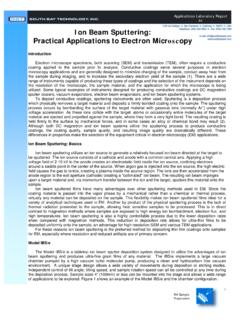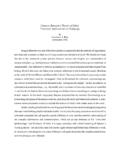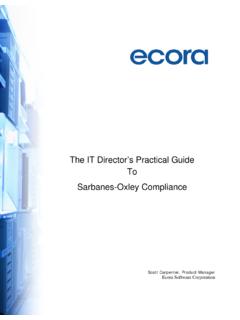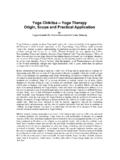Transcription of The Practical Primacy of Questions in Action Learning
1 Action Learning and Its Applications, Present and Future. (2010) Boshyk, Yury and Dilworth, Lex (Eds.) Palgrave Macmillan Publishers. The Practical Primacy of Questions in Action Learning Marilee Adams, Abstract The centrality of Questions in Action Learning is fundamental for both theory and practice. Reg Revans, the principal pioneer of Action Learning , a scientist who made important contributions to the fields of management and organizational development, put the search for fresh Questions and questioning insight at the core of Action Learning . He emphasized that questioning insight is the starting point and that people learn very effectively from and with each other, as distinguished from highly formal didactic approaches to Learning . His focus was on Learning while doing, with Questions accelerating and deepening this process, which also includes self-questioning and reflection.
2 One reflects on what has occurred or what is occurring (reflection in Action ), which allows one to harvest the Learning . Asking Questions invigorates thinking, Learning , Action , and results. Interpersonal Questions are used for speaking and communicating with others. Internal Questions are used for thinking, Learning , and reflection within oneself. In either case, one best arrives at effective answers and solutions by route of the best Questions . Traveling this route requires resisting the expediency of easy answers and immediate concentration on solutions. Rather, it depends on thought-provoking Questions that get to the heart of the matter and can yield more effective answers and solutions, both in the short term and the long term. Reinforcing an inquiring mindset in the context of Action Learning bolsters the habit of questioning and the quantity and quality of Questions asked, which can also contribute to generative Learning well beyond the experience itself.
3 Introduction Today, the perspectives and processes of Action Learning , in which question asking is so primary, are widely respected as a powerful approach with objectives such as leadership development, organizational change, team building, problem solving, raising self- efficacy, and building competitive advantage. While some see Action Learning as a last resort when traditional methods fail, the Practical imperative to develop leaders, managers, and other professionals capable of traveling the route to thoughtful and effective solutions impels many organizations and businesses globally to engage in Action Learning . The chapter builds on Revans's premise about the Primacy of Questions , questioning insight, and curiosity as the foundation of Action Learning . Curiosity-fueled adult Learning , where spontaneity is encouraged, can be strengthened and operationalized by focusing on the question asker as well as on the question.
4 We begin by exploring the centrality of Questions in Action Learning and the power and purposes of Questions in general. We note the role of internal Questions in thinking, reflection, Learning , and problem-solving as well as the role of interpersonal Questions in communication and collaborative problem- solving. The tendency to value answers more than Questions is discussed. We also explore the relationship between Questions and their impact on results for both individuals and teams. Enhancing awareness and skills of effective question asking Copyright Marilee Adams, Lambertville, NJ 2009 1. Action Learning and Its Applications, Present and Future. (2010) Boshyk, Yury and Dilworth, Lex (Eds.) Palgrave Macmillan Publishers. strengthens Practical avenues for Learning , reflection, and collaboration and also contributes to a greater probability of achieving real-world business results.
5 Action Learning and the Primacy of Questions While there are many variations of Action Learning , there are several fundamental characteristics that Revans associated with it: the Primacy of questioning insight over programmed knowledge, individuals/teams preferably (but not always) assigned to solve problems with which they have little or no familiarity, Learning (is) given priority over problem solution, and there is selection of a real problem focus always. (Dilworth and Willis, 2003, ) While Learning is the first focus, urgency to solve the real problem is what powers the Learning engine.. This focus on Learning while doing, typically occurs within an organizational, system, or team context. In an Action Learning program, a team uses a key business challenge as a vehicle for intentional Learning that often leads to accidental and unexpected Learning as well.
6 Practice varies within different schools of Action Learning , including the definition and involvement of a team advisor or Learning coach, the degree of direct focus on Learning , the types of Learning sought, and whether the team addresses a joint or individual business challenge. Experiential Learning focused on the business challenge marks all these endeavors, and may include teams working in simulation situations. (Dilworth and Willis, 2003, ) While Revans thought that simulations didn't meet his standard that Action Learning should focus on real, even daunting problems, what is real . today can be found within sophisticated computer simulations and other simulation formats that address real issues in real time. These include those related to homeland security, military operations, and the complex issues facing global organizations.
7 It is not surprising that Dilworth and Willis cite the Primacy of questioning insight as the driver of Action Learning . They note that Revans repeatedly (made) the point that fresh' Questions are central to Action Learning (Dilworth and Willis, 2003, ). Virtually every writer and practitioner of Action Learning echoes this fundamental theme about the Primacy of Questions in Action Learning . For example, Marquardt tells us, .. in Action Learning , Questions are not only seeking answers. Rather, they are seeking to go deeper, to understand, to respond to what is being asked, to give it thought. Asking Questions is not only a quest for solutions but also an opportunity to explore.. (Marquardt, 1999, pp. 30-31) Kramer writes that, The power of Action Learning comes from the many ways it develops the skills and habits of questioning, listening, and reflection.
8 As in the Socratic method, Questions are more important than answers during Action Learning . (Kramer, Winter 2007-08, p. 40) Czajkowski considers Action Learning a construct through which participants learn questioning skills. (Czajkowski, 2009, personal conversation) These perspectives on the Primacy of Questions in Action Learning are echoed in the following comments by participants and facilitators of Action Learning programs. One of the predominant learnings cited by all participants was the use of questioning insight. They used this Learning both in the program and back on the job.. Questions can move you in a direction that you did not think about Copyright Marilee Adams, Lambertville, NJ 2009 2. Action Learning and Its Applications, Present and Future. (2010) Boshyk, Yury and Dilworth, Lex (Eds.)
9 Palgrave Macmillan Publishers. because you were in that box and you were not thinking .. Now all of a sudden they have a realization and start questioning their initial decision. (O'Neil and Marsick, 2007, p. 142-143). This jolt this realization that asking Questions is the key to beginning to think, to doing different things, and to doing things differently and Learning is something many participants comment on. (Weinstein, 1999, p. 178). In essays and self reports, I noticed a pattern that asking Questions would bring new understanding. They would get most excited about their own best Questions . They would try so hard to come up with Questions . These became milestones and landmarks. And yes, you see them developing these questioning and reflection skills all the time.
10 They integrated questioning skills and continued this up until the last process (in their AL experience). (Willis, 2008, personal conversation). Revans on Learning and Questions The term Action Learning implies intentional Learning . Revans notes that this is vital because, in any epoch of rapid change, those organizations unable to adapt are soon in trouble, and adaptation is achieved only by Learning .. (Revans, 1983, p. 11) This is as true for individuals as it is for organizations. For Revans, therefore, the goal became accelerating the rate of Learning to anticipate, match, and even exceed the rate of change. Revans famously described Learning (L) as the result of programmed knowledge (P). and questioning insight (Q). Hence we have his Learning Equation: L = P + Q.








